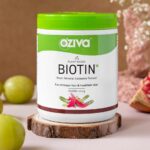Getting ready for a season of marathons, fun runs, walk-a-thons, half-marathons, or brisk jogs? Whatever your pace and scene, OZiva promises to support you with the right clean, plant-based nutrition products to keep your endurance steady and enthusiasm high! Your training times can often be long and draining to the body, so getting the right nutrition is extremely important. As a runner, you might know you need high-quality carbohydrates and healthy fats to fuel you. And protein is undoubtedly the star of the show, but which protein is the best for you as a runner? Let’s read about plant protein, its nutrition profile, and what MAJOR difference it can make for you as a runner!
Hey Runner! What Nutrition Do You Need?
If you’re reading this as a runner or want to ensure the right nutrition for a runner you know, let’s start by understanding the basics of nutrition for runners.
Performance nutrition differs for every athlete, and every runner will have a different ideal regime. Three key macronutrients, however, remain the same, as do their proportions in your diet:
- Carbohydrates: If you’re looking to run longer distances, carbohydrates will be your main source of energy. Your body will break down these carbs into sugar glucose. The body needs glucose to produce adenosine triphosphate, which fuels your energy. During a run, your body takes charge and sends glucose to your muscle cells as an immediate energy source. During high-intensity exercise, your body’s oxygen levels deplete and it turns to carbohydrates to keep the energy going. As a runner, your diet should consist of around 45-60% daily carbohydrates!
- Fat: For lower-intensity long-distance runs lower than 10km, your body changes its fuel source and turns to its stored body fat. Your body first breaks these fats down into triglycerides, and then further into glucose. Fats take time to generate, so if you’re looking for a fuel source for higher-intensity runs, don’t depend on them. But consume your fats as part of a healthy, balanced diet and to keep your runner’s health high. Eat a mixture of fats including saturated (butter and coconut oil), polyunsaturated (seeds, avocados), and monounsaturated (olive oil, avocados and some nuts).
- Protein: Experiencing muscle wasting, constant injuries and an average running performance? Don’t rack your head for the cause, put it down to inadequate protein. Protein is not your primary fuel source during runs, but it’s probably the most important macronutrient of them all for long-lasting powerful effects! Your body uses protein to support muscle growth, improve tissue repair, reduce injuries you can get, and help speed up your muscle recovery. When you’re constantly running, your muscles need to break down and rebuild effectively. As a runner, you’ll need 1.4-2 grams of protein daily to maintain your muscles. And it’s not a guarantee that you’ll get this amount from your diet, so you might have to look for protein powders to make up the difference. Consume your protein around 20 minutes post your run.
We’ll explain a bit later why plant protein is the perfect one for you!
Plant Protein: Better Runs, Stamina & Recovery
So you’re sure you want to try out protein powders, and you get on the internet or ask your circle which one to choose. You might hear back that plant protein is only for bodybuilders and weightlifters, and runners have no business with it! That could not be more false.
Plant protein can be a vital part of a well-rounded and balanced nutrition regime for any runner, serious or casual, long-distance or low-intensity. If you’re a vegetarian or vegan runner, plant protein might be an obvious choice. But even if you’re not, it can have numerous benefits for you:
- Get All Nine Branched-Chain Amino Acids (BCAAs): You might have heard the term in your community or runners’ group, but what does it actually mean for you? These BCAAs are the building blocks of protein. There are totally 20 BCAAs, of which nine are essential. Your body needs these nine amino acids to function, but it cannot produce them and needs to get them from outside. These amino acids control the following factors in runners’ bodies – fat metabolism, immune function, muscle growth and regeneration, appetite, sleep, mood, wound healing, energy function and sleep-wake cycles. Pea Protein contains all nine of these essential amino acids.
- More Well-Rounded Nutrition Profile: Plant protein gives you not just protein, but also contains a better vitamins and minerals profile. Deficiencies of certain vitamins for runners like Vitamin D, the B-Vitamins and Iron can impact your energy levels and performance as a runner. Iron, for instance, keeps your blood rich in oxygen, and without it you are likely to feel winded before your run. Vitamin D improves your bone health and the B-Vitamins (especially Folic Acid) are necessary to improve energy metabolism, repair muscle tissue, and synthesise more protein. Female athletes, especially vegetarians, vegans and those with disordered eating habits, are low in the B-vitamins and need that boost.
- More Performance and Endurance: Plant protein has strong antioxidant and anti-inflammatory properties, which means that it can result in shorter muscle recovery times, reduced muscle soreness, less joint pain and faster recovery after injuries. It improves your stamina consistently and as a result, improves your performance and endurance.
Types of Plant Protein You Can Explore
You’ve said yes to plant protein, but which one should you go for? Here are some of the best plant proteins for athletes and runners:
- Pea protein: Pea protein is a great source of branched-chain amino acids (BCAAs), which are important for muscle growth and recovery. Pea protein is also easy to digest, making it a good choice for athletes who have trouble digesting other types of protein.
- Hemp protein: Hemp protein is a complete protein, meaning it contains all the essential amino acids your body needs. Hemp protein is also a good source of omega-3 fatty acids, which are important for inflammation control and joint health.
- Brown rice protein: Brown rice protein is a slower-digesting protein, making it ideal for taking before bed or during long workouts. Brown rice protein is also rich in B vitamins, which are important for energy production.
- Quinoa: Quinoa is a complete protein that’s also high in fibre and minerals. Quinoa is a good pre-workout option because it’s digested slowly and can help you feel fuller longer.
However, not all these plant proteins have a complete BCAA profile. The best way for you to get that is to go for a plant protein powder that is a mixture of two or more of the above protein sources. And OZiva has the perfect option for you there!
Bioactive Plant Protein
OZiva Bioactive Plant Protein contains 25g of plant protein per serving, drawn from high protein foods like Pea Protein, Mung Bean and Brown Rice. Plant protein contains several amino acids that are essential to signal muscle growth/repair and act as a substrate during muscle protein synthesis.
This bioactive plant protein contains an Advanced Recovery Formula which is a combination of MD-ZenPro, and Ashwagandha. MD-ZenPro is a blend of a clinically proven active, which includes Curcumin, Green Coffee and Protease (a digestive enzyme). This bioactive ingredient Gremin in this vegan protein contributes towards 4X Muscle Recovery* from muscle damage and pain. Protease also helps in 59% Faster Protein Absorption^ due to improved protein hydrolysis to amino acids.
Ashwagandha helps the body to adapt to stress and thus assist recovery. It speeds up muscle growth, relieves pain and improves athletic performance.
This plant protein for runners makes use of bioactive ingredients for optimal muscle health, better endurance, muscle recovery, and for better sleep. This plant protein improves athletic performance due to the presence of 100% RDA of vitamins and minerals. Vitamin D helps in growth and muscle maintenance, Vitamin B12 improves muscle growth and coordination. Iron is critical for optimal athletic performance and endurance because of its role in energy metabolism, oxygen transport and acid-base balance.
Buy it here.
Last modified: August 11, 2023



